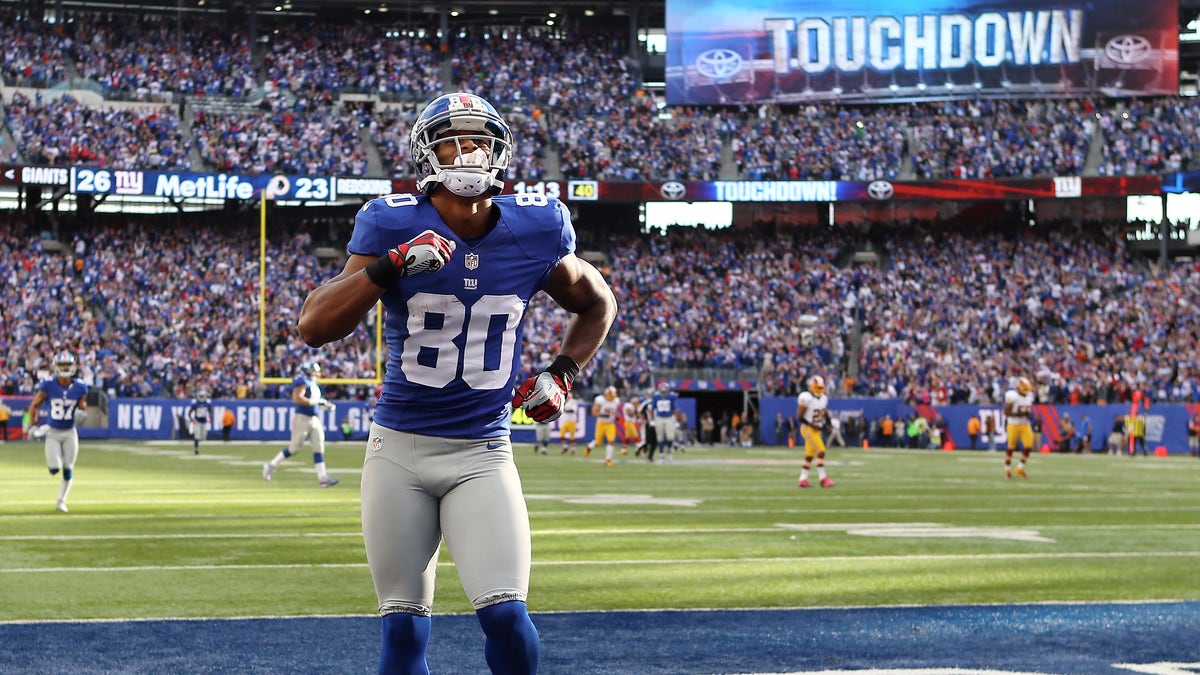
Victor Cruz celebrates after he scored the game winning touchdown in the fourth quarter against the Washington Redskins on October 21, 2012. (2012 Getty Images)
As a Latino, I'm a member of a minority group that is often said to be "expressive" and characterized as “hot-blooded” by Hollywood. Watch any telenovela and you'll see what I'm talking about.
We are warm and expressive –it's our nature and our culture– and we're OK with that. The question is, Should that expressiveness be tamped down or even forbidden for the sake of some degree of cultural opaqueness or conformity? In sports, too often the answer is yes.
Celebrate for more than 10 seconds, or 12 or 15 and you're going to get hit with a flag. But should Victor Cruz be penalized for his signature salsa dance? If he played in the SEC, for sure he would be.
Years ago, when I began to witness the trend outlawing celebrations (like dancing in the end zone after a touchdown), a handful of colleagues and I –in both news and sports– began to question the reasoning behind it. We argued that minorities in sports often come from backgrounds that are passionate, emotional and thereby more apt to celebrate openly.
The NFL has become known as the “No Fun League” for the draconian penalties it has handed down over the years for “excessive celebrations” mostly against African-American running backs and receivers.
I argued this week on air during my radio show on WIOD in Florida with a high school official who seemed to support the rule. He assured me that players are warned before the season about excessive celebration.
Hearing that, I asked him to define "excessive." He couldn’t.
You know why he couldn’t? It’s because 'excessive' for him likely means something entirely different than what it means to a referee from Jamaica, or for that matter from say, Norway. You get the picture, the rule itself is non-workable if for no other reason than the mere fact that it’s culturally subjective.
Let me be very clear here in distinguishing a "celebration" from a "taunt" or an intentional interruption of the game. We all know what a taunt is. We know it because it involves denigration. It's the guy who dances over his opponent or slams the ball at his feet.
We also know what a delay of game is, because it can be quantified. Celebrate for more than 10 seconds, or 12 or 15 and you're going to get hit with a flag. But should Victor Cruz be penalized for his signature salsa dance? If he played in the SEC, for sure he would be.
Players in college are penalized for less, much less.
The NFL has softened its celebration standard, but the NCAA has not, testing the patience of many a hot-blooded type, while leading still others to applaud the "excessive celebration" penalty as a necessary evil.
But this week, something happened down in Texas that is bringing together both opponents and supporters of the rule.
At the Track and Field Regionals held Saturday, a relay team from Columbus High School was disqualified for an excessive celebration act at the conclusion of the boys 4 x100 meter relay.
What did the athlete do that was so terribly bad? He physically gave thanks and credit for his achievement to God. That’s it. In fact, here’s how it’s described in USA Sports:
"The meet official indicated the athlete crossed the finish line and gestured upward with his arm and finger and behaved disrespectfully toward meet officials, in their opinion. In the judgment of the official, this was a violation of NFHS track & field rule 4-6-1. The regional meet referee concurred with this decision and the student was subsequently disqualified."
Some people would say that “a rule is a rule” and so be it. However, many of us have been arguing for years that just because it's a rule, doesn't mean it's a good rule. Taunting? I get it. Delay of game? I get it. But excessive celebration? C’mon! Happiness should not be made illegal, nor should celebrating your faith. Finally, something we can all agree on.
